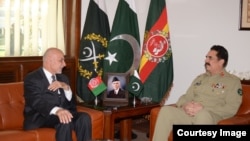Afghan President Ashraf Ghani’s first state visit to neighboring Pakistan over the weekend has generated an unusual level of optimism on both sides of the border, with some hailing it as the beginning of a new era in the often acrimonious bilateral relationship.
Ghani spent a busy time during his two-day stay in Pakistan, where he held detailed discussions with Prime Minister Nawaz Sharif and other political leaders. The high point of his engagements, though, was a visit to the headquarters of the powerful Pakistan military that many Afghans accuse of fueling the conflict in their country.
Former ambassador to the United States, Sherry Rehman, was among the Pakistani politicians who met with Ghani on the sidelines of his visit. Speaking to VOA, she said that the Afghan leader seemed determined to set the tone for ending tensions in bilateral relations.
“It was a clear effort by the new [Afghan] leadership to reach across the board very positively and engage in a constructive, forward-looking agenda with a clear realization of the problems that the bilateral relationship has faced in the recent and other past," said Rehman. "So, I think the idea of leaving it behind and leveraging our potential both for trade as well as people-to-people integration as South Asian energy hub can only be realized if we are able to solve our counter-terrorism and strategic problems. And I do see the political will at least from both sides to overcome that.”
Optimistic outlook
Speaking to VOA by phone from Kabul, Afghan politician and a close aide of Ghani, Professor Farouq Azam, also sounded optimistic, saying the visit will go a long way toward building much-needed mutual trust.
“I think this is [the start of] a new era and President Ghani, as man of development, man of economic prosperity and vision, has put forward a new thesis that instead of being in confrontation mode let us be in cooperation mode and find the ways how we can benefit the conditions to the benefit of our people,” said Azam.
Azam is cautiously optimistic about President Ghani’s trip to Pakistan's military headquarters in Rawalpinidi and talks with Army Chief General Raheel Sharif.
"This is a significant gesture on the part of Pakistan as well that Pakistan showed to President Ghani that the military headquarters is open to him, and Ghani also probably has thought that the military in Pakistan is deciding matters, not the civilian government. So, that is a good gesture and I think they can go forward. But the thing is whether practically we can put it in that way if we can in practice do work together," said Azam.
Military policies
Ambassador Rehman disagreed with criticism that the Pakistan military dictates Afghan policy to the country’s civilian rulers. She said that direct interactions between relevant institutions on both sides of the border would help ease tensions because counter-terrorism challenges in bilateral relations mainly stem from differences over counter-terrorism policies:
"I think it is a good move and I think the whole business of coercive diplomacy through the media from all sides have to stop. Public messaging is not the way to conduct diplomacy," said Rehman. "You send each other a message if you are looking to solve a problem. And I think that is the way forward and I think Afghanistan and President Ghani have signaled their interest in taking that kind of positive initiatives. So, I would really look towards the future and building on whatever little gains we can make right now.
Former President Hamid Karzai used to frequently accuse the Pakistan military of allowing Afghan insurgents to direct the Taliban insurgency in Afghanistan and insisted Islamabad could influence the Islamist group to come to the table for talks with the Afghan government.
While critics are unsure whether Pakistan can persuade the Taliban to become part of Afghan political reconciliation efforts, Professor Azam calls for the new Afghan leadership in Kabul to urgently devise its own peace plans before seeking external help:
“To a large extent peace depends on Afghanistan itself and this is the job of the government of Afghanistan that first to clear itself that whether the government of Afghanistan wants peace," said Azam. "And if yes, then what kind of peace they want and they must come out with a clear definition and a clear mechanism and give way to a reconciliation in order to move forward practically, and then they can go to other countries to ask for help.”
The United States also believes that despite deep-rooted challenges, Pakistan and Afghanistan under Ghani seem determined to seek a fresh start in their bilateral relations. U.S. Special Representative for both the countries, Dan Feldman, expressed these view while speaking to VOA on the eve of Ghani’s landmark trip to Islamabad.
“This is the most alignment that I have seen in terms of the opportunity to start this new chapter in the relationship and I think there are so many areas of potential progress here on cross-border military issues, on counterterrorism issues," said Feldman. "There are many things that could be a great dividend for the people of Pakistan and the people of Afghanistan if the two countries can work together better, and we see every indication that that’s possible given the commitment and desire both by the Pakistani leadership and by the Afghan leadership.”
Analysts hope that Ghani’s visit to Islamabad will lead to enhanced security cooperation between the two countries and better management of their long and porous border to prevent militants from seeking sanctuaries and fueling militancy in both countries.




